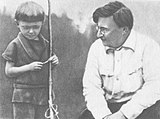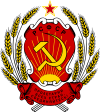Vyacheslav Menzhinsky
Vyacheslav Menzhinsky | |
|---|---|
Вячеслав Менжинский | |
People's Commissar for Finance of the RSFSR | |
| In office 30 October 1917 – 21 March 1918 | |
| Premier | Vladimir Lenin |
| Preceded by | Ivan Skvortsov-Stepanov |
| Succeeded by | Isidore Gukovsky |
| Personal details | |
| Born | Wiesław Mężyński 19 August 1874 |
| Alma mater | Saint Petersburg State University |
Vyacheslav Rudolfovich Menzhinsky (
Early life
Vyacheslav Menzhinsky, a member of the
Political activism
Menzhinsky had joined the
Writing in the Russian emigre journal, Our Echo in July 1910, Menzhinsky wrote:Lenin is a political Jesuit who over the course of many years has moulded Marxism to the aims of the moment ... Lenin, this illegitimate child of Russian absolutism, considers himself not only the natural successor to the Russian throne, when it becomes vacant, but also the sole heir of the Socialist International. Should he ever come to power, the mischief he would do would not be much less than that of Paul I. The Leninist are not even a faction, but a clan of party gypsies who hope to drown the voice of the proletariat with their screams.[5]
Personality
Trotsky who knew Menzhinsky from when they were exiles, in 1920, left a scathing portrait of him: "The impression he made on me could best be described by saying that he made none at all. He seemed like a poor sketch for an unfinished portrait. Only now and then would an ingratiating smile or secret play of the eyes betray his eagerness from insignificance ... No-one took any notice of Menzhinsky, so quietly toiling away over his papers."[6]
Later life
After the
In April 1918, Menzhinsky was appointed Soviet consul general in Berlin, but in November, he was expelled, along with the Ambassador
Meanwhile, the
Death
Menzhinsky spent his last years as an invalid, suffering from acute
Menzhinsky died on May 10, 1934, at the age of 59. When his successor, Yagoda, made his public confession under duress at the Moscow
Menzhinsky was cremated and his ashes was buried in the Kremlin Wall Necropolis.
Gallery
-
Menzhinsky with his sisters
-
Menzhinsky, 1899
-
Menzhinsky sometime in the 1880s
-
Menzhinsky, 1905
-
Menzhinsky, 1917
-
Members of the presidium of CheKa (left to right) , Menzhinsky, 1921
-
Menzhinsky, 1926
-
Menzhinsky with his son Rudolf
-
Menzhinsky, 1928
-
Menzhinsky, cover of Time magazine, 1931
-
Menzhinsky, 1932
-
Menzhinsky, 1933 (last known photo)
See also
- Bibliography of the Russian Revolution and Civil War
- Chronology of Soviet secret police agencies
- Commanders of the border troops USSR and RF
References
- ISBN 0-75381-766-7.
- ^ Rayfield, Donald (2005). Stalin and His Hangmen: The Tyrant and Those Who Killed for Him. Retrieved 12 October 2021.
- ^ Krupskaya, Nadezhda (1970). Memories of Lenin. London: Panther. p. 138.
- ^ Biggart, John (1989), Alexander Bogdanov, Left-Bolshevism and the Proletkult 1904–1932, University of East Anglia, p. 150
- ^ Shub, David (1966). Lenin. Harmondsworth, Middlesex: Penguin. pp. 180–81.
- ^ Trotsky, Leon (1975). My Life. Hardmondsworth,Middlesex: Penguin. pp. 465–66.
- ^ Shub. Lenin. pp. 305–06.
- ^ "Vyacheslav Menzhinsky" article on the Spartacus Educational website Archived 2013-07-03 at the Wayback Machine
External links
- Great Soviet Encyclopedia
- (in Russian) A Pince-nez Among Leather Jackets, a biography article at the FSBwebsite
- The German-Bolshevik Conspiracy, War Information Series No. 20, October 18, p. 9.













